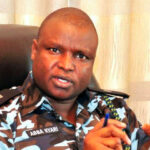
NIGERIAN soldiers’ propensity for brutality and extrajudicial killings continue to embarrass the country and its military. In a fresh incident on Monday, a soldier at the Babana community in Borgu Local Government Area, Niger State, shot a nursing mother and her infant to death. Such avoidable waste of precious lives requires a critical re-engineering of the mindset of some of the country’s military personnel. Those involved must face justice and their commanders held accountable.
Inexplicably, the lawless soldier, assigned to protect the people from bandits, fired the fatal bullet because the commercial motorcyclist conveying the victims allegedly refused to pay him a N200 bribe at a checkpoint. The bullet penetrated the rider’s stomach before savaging mother and child. The rider is battling for his life.
Other cases of lawlessness by soldiers abound. One is the recent killing of a secondary school pupil, identified as Pelumi, and a tricycle operator, Aloma, by soldiers attached to the Operation MESA security outfit in Makoko, a backwater community in Yaba, Lagos State. Reports said two political factions had a disagreement in the aftermath of the 2023 presidential/National Assembly elections. A faction, however, brought soldiers who stormed the community and allegedly opened fire on residents. When the dust settled, Pelumi and Aloma lay dead.
The Nigerian military, which should embody the highest level of discipline, has continued to harbour some personnel who behave like common thugs. Sadly, officers, who should exercise effective control over them sometimes, by acts of commission or omission, are remiss. Hence, their subordinates commit atrocities against civilians without consequences.
Operation MESA was established to complement anti-violent crime law enforcement in the states; but some operatives meddle in minor disputes among civilians. In 2018, an Ogun State resident, George Oyekan, was beaten to death by soldiers from the 174 Battalion Barracks, Ogijo, following the man’s dispute with his landlady over rent.
In March 2022, soldiers from the Nigerian Army Battalion, Ibodi, Ilesa, Osun State, battered a car dealer, Adeyinka Adekunle, to death after an argument at a pub. The deceased was allegedly forced to eat his own vomit during torture in the barracks.
The belligerence does not stop with civilians. Unruly soldiers fight other security agents who challenge their impunity. In January 2023, a soldier assaulted traffic wardens after a bus driver he encouraged to drive against traffic was arrested in Lagos. A similar scenario played out in November 2022 when soldiers battered a police officer and an official of the Lagos State Traffic Management Authority on Eko Bridge after the military men were asked to desist from a traffic rule infraction.
In August 2022, six unruly soldiers driving against the traffic dragged two police officers on traffic duty to the Ojo Army Cantonment, Lagos, where they beat one of the police officers, Monday Orube, to death. A police Inspector, Hosea Yakubu, was similarly beaten to death by soldiers at Eleme, Port Harcourt, Rivers State, in 2020. Soldiers from Ibereko Barracks, Badagry, Lagos State, in 2011 while protesting the killing of their colleagues, murdered a Divisional Police Officer, a Divisional Crime Officer, and eight other police officers in retaliation!
The National Human Rights Commission lamented that during the first few weeks of enforcement of the COVID-19 lockdown in 2020, police and military personnel killed 18 persons, when the coronavirus itself had only killed 12. Amnesty International reported that between 2011 and 2022, hundreds of civilians died in military custody in the country. In most cases, justice remains elusive for victims and their families.
Everywhere, the military is a bastion of discipline, and leadership training. In developed countries, having a military background is an advantage when contesting a political office. No fewer than 31 of the 45 presidents of the United States had prior military experience.
But in Nigeria, some soldiers are brutal bullies perpetually turning on civilians. Their impunity must come to an end. Responsibility for this lies with the Service Chiefs, the defence minister, and ultimately, the Presidency.
When a British soldier, Lee Rigby, was killed by two Nigerian-born Britons in London, UK, in May 2013, the suspects were not dragged into the barracks and tortured to death. The military did not interfere until the police arrested the Islamic terrorists, who were taken to court, tried, and sentenced to life imprisonment. But in Nigeria, when a soldier is attacked or killed, entire villages and communities could be attacked in revenge. Their commanders and the political leadership have not demonstrated a strong enough aversion to such carnage.
A recent case of a police officer alleged to have killed a soldier in Ogijo, Ogun State, reportedly led to the burning of a police station and a patrol van in retaliation.
The problem is impunity; the same soldiers are usually well-behaved when on foreign peacekeeping missions. The United Nations said Nigerian troops were the backbone of the UN Peacekeeping Mission in Liberia from 2003 to 2018.
The state governors should insist on adequate punishment for errant military personnel. A former Lagos State Governor, Babatunde Fashola, in July 2012, arrested an Army colonel and a staff sergeant committing a traffic offence; not only were they publicly shamed, they were also handed over to the authorities for sanctions. This must be emulated by state executives.
Military officers who commit crimes, after going through the internal disciplinary action, should be handed over to the police for prosecution. Police commissioners should insist on justice for their men brutalised or killed by soldiers.
The Chief of Defence Staff, Lucky Irabor, and the Service Chiefs should resolve to end lawless behaviour by personnel embarrassing the military.
The role of the military in national defence is acknowledged and appreciated by Nigerians. These are men and women who for love of country have voluntarily signed on to defend its sovereignty, with their lives if necessary. They have proved their mettle over time at home and abroad. They are ideally, heroes and heroines, not bullies. But the errant minority among them discredit their vaunted institution by violently oppressing civilians.
The President, Major General Muhammadu Buhari (retd.), the Service Chiefs, senior commanders and NCOs must resolve to stop the indiscipline and preserve the respect and dignity of the reputable, unifying institution.





